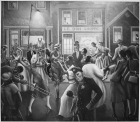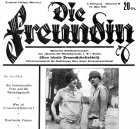Society
How people group together, organise their rules and systems are all part of what create a society. In this section articles examine the nature of society how it interacts with other themes of culture, power, etc. and how societies have developed and changed over time. The structures of the ancient world are explored as are the complex feudal systems and the varied societies of Empire and modernity.
Sort by:
Date (Newest first) | Title A-Z
Show:
All |
Articles |
Podcasts |
Multipage Articles
-

Whose past is it anyway? Telling Russian and Soviet history through diverse Jewish voices
ArticleClick to view -

What Have Historians Been Arguing About... schooling and the British Empire
ArticleClick to view -

Historical anniversaries calendar
ArticleClick to view -

Tracing the popular memory of Rosa Parks with Year 9
ArticleClick to view -

Shaping what matters: Year 9 decide why we should care about the Windrush scandal
ArticleClick to view -

What Have Historians Been Arguing About... Modern British LGBTQ+ history
ArticleClick to view -

Lengthening Year 9’s narrative of the American civil rights movement
ArticleClick to view -

Triumphs Show: Recovering the queer history of Weimar Germany in GCSE history
ArticleClick to view -

What Have Historians Been Arguing About... youth culture?
ArticleClick to view -

Fifties Britain through the senses: ‘never had it so good’?
ArticleClick to view -

Cunning Plan 190: Using art to make A-level history more accessible
ArticleClick to view -

Helping Year 8 to understand historians’ narrative decision-making
ArticleClick to view -

Recorded webinar: Queer beyond London
ArticleClick to view -

Recorded Webinar: Resisting Reagan
ArticleClick to view -

Film series: The African-American Civil Rights Movement
ArticleClick to view -

Ensuring Gypsy, Roma and Traveller children do not feel unseen in the history classroom
ArticleClick to view -

Do Gypsy, Roma and Traveller children see themselves in your history classroom?
Multipage ArticleClick to view -

Film: “The Talk Should Not Be Broadcast”: Homosexuality and the BBC before 1967
ArticleClick to view -

Secondary Education and Social Change in the UK since 1945: KS3 resource packs
Multipage ArticleClick to view -

Teaching Britain’s ‘civil rights’ history
ArticleClick to view

